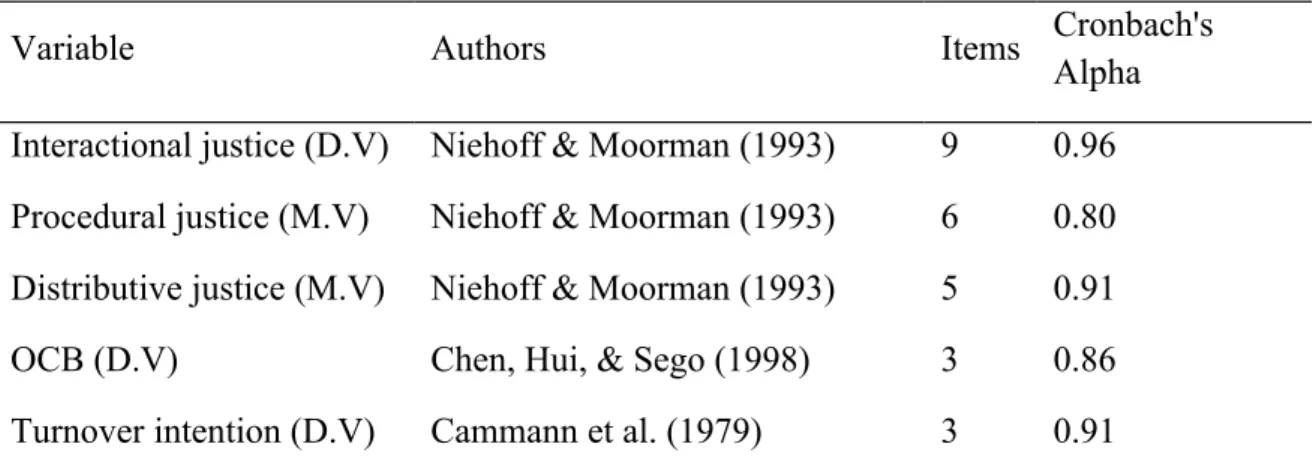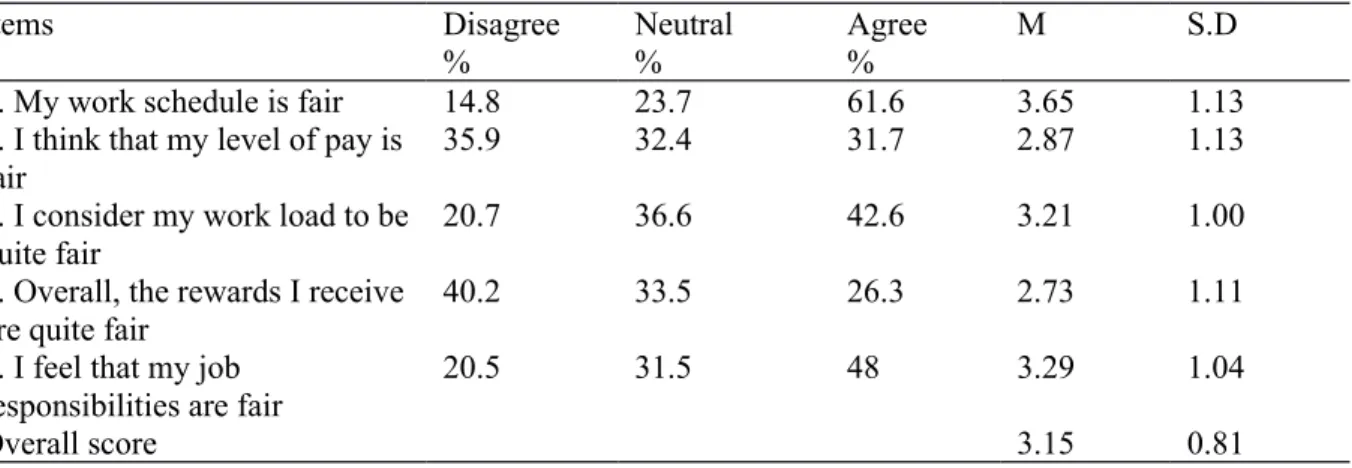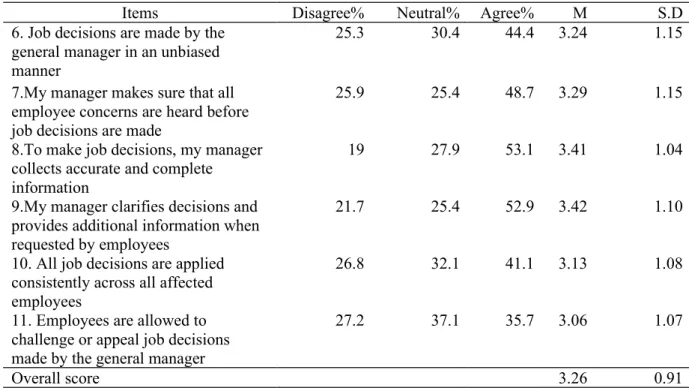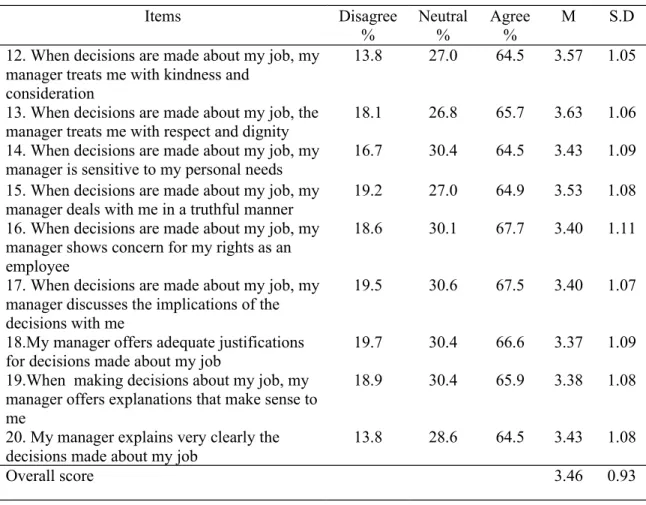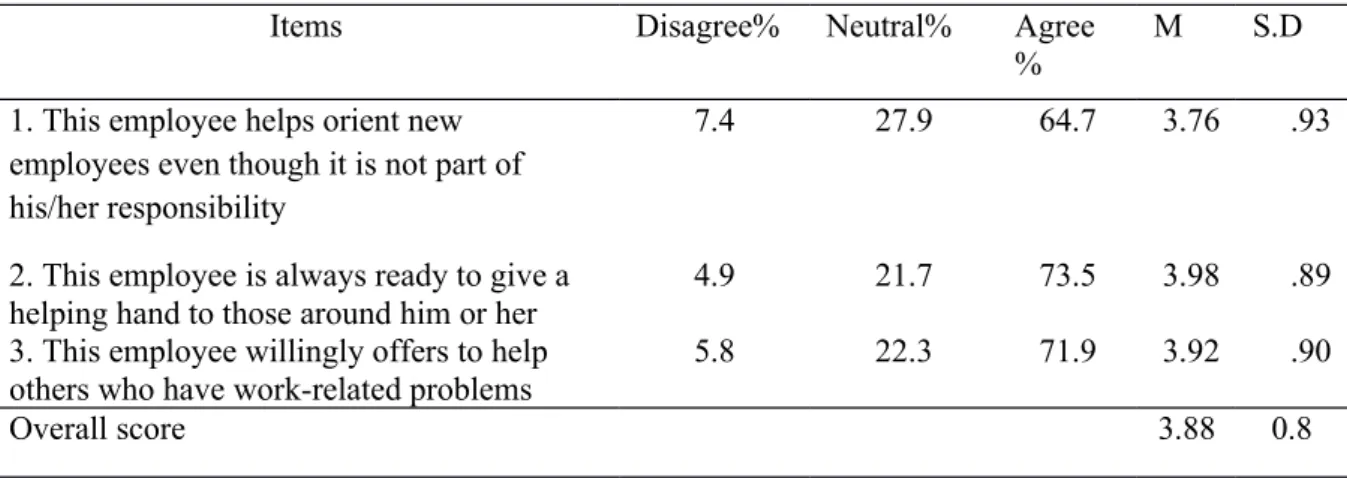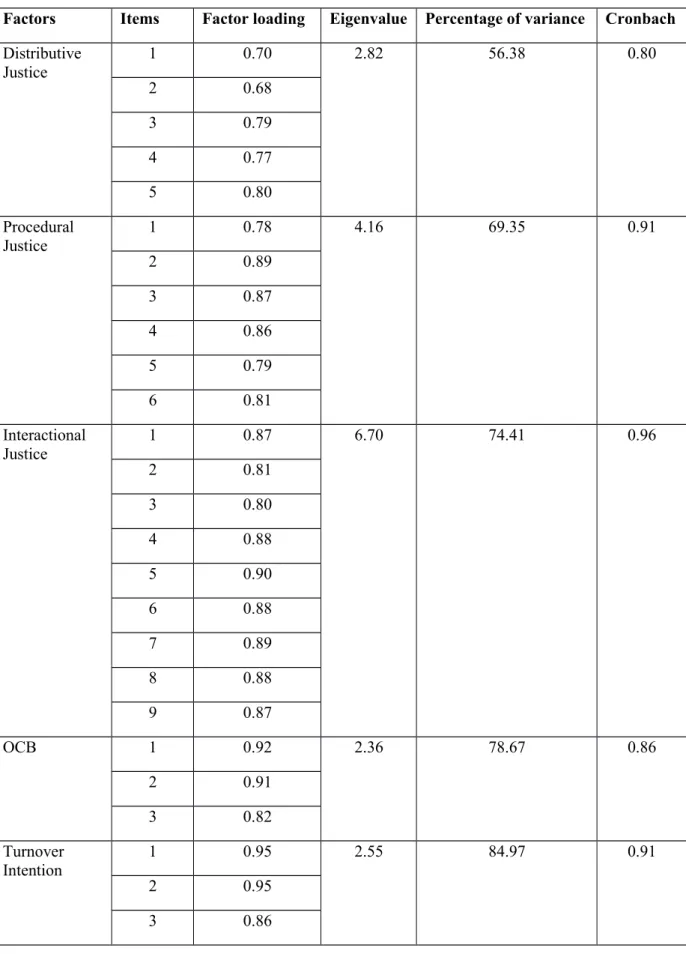Procedural and distributive justice as mediators of the relationship between interactive justice and job outcomes : an empirical study of the UAE public. This study examines the direct and indirect effects of different dimensions of organizational justice on organizational citizenship behavior and intention to leave in a non-Western context of the healthcare sector in the United Arab Emirates (UAE). This study is one of the first empirical studies of its kind to demonstrate the role of procedural and distributive justice as mediators between interactional fairness and employee job outcomes (organizational citizenship behavior and turnover intent).
The results of this study show that each of the dimensions of organizational justice, which influence employees' attitudes and behaviors in the health care sector, gives us a better understanding of the importance of organizational justice and its dimensions, and influence.
Introduction
The next section describes health care in the UAE, and in particular the Abu Dhabi Emirate, and provides a brief overview of the research. Fourth, the quality of the public health care system has surpassed the private health care sector (Jabnoun & Chaker, 2003). In other words, it contributes to the organizational justice literature and management practice in the healthcare sector by providing empirical evidence of the impact of organizational justice on both organizational citizenship behavior and turnover intention.
This is followed by a discussion of the development of key theories of organizational justice, organizational citizenship behavior and intention to leave and the associated empirical research.
Literature Review, and Research Question(s)
A review of the organizational justice literature shows that previous studies have identified different dimensions of organizational justice. The focus of this research is on the three dimensions of organizational justice (procedural, distributive, and interactional justice) because they have received the most attention among justice researchers (Bies, 2001; Cohen-Charash & Spector, 2001) and have been examined in some recent studies in non-Western the context; for example, studies by Erkutlu (2011), Hassan and Hashim (2011), and Nadiri and Tanova (2010). Interactional justice is a new form of organizational justice (Ince & Gul, 2011) introduced by Bies and Moag (1986).
What type of organizational justice is needed to implement an effective strategy to retain healthcare professionals and promote organizational citizenship behaviors.
Theory
He found that procedural justice and four dimensions of organizational citizenship behavior correlated with perceptions of fairness. The results showed that distributive justice has a positive impact on organizational citizenship behavior through perceived organizational support. There are many studies aimed at understanding the dynamics of organizational justice on organizational citizenship behavior.
Research consistently shows that there is a positive and strong relationship between organizational justice and organizational citizenship behavior. Recent studies have examined the relationship between organizational justice and organizational citizenship behavior using various mediators and moderators (Chegini, 2009; Cheung, 2013; Cloninger, Ramamoorthy, & Flood, 2011; Erkutlu, 2011; Ertürk, 2007). One recent study using two dimensions of organizational citizenship behavior (OCBO and OCBI) using perceived organizational support as a mediator between organizational justice and organizational citizenship behavior concluded that perceived organizational support fully mediates the influence of two dimensions of organizational justice (interpersonal and informational justice) on two forms of organizational citizenship behavior (OCBO and OCBI) (Cheung, 2013).
One of the studies that used organizational justice as a moderator between organizational citizenship behavior and turnover intention was by Sharoni et al. In this study, organizational justice did not moderate the relationship between organizational citizenship behavior and turnover intention, which means there is a direct relationship between organizational justice and turnover intention. Recent research has found that organizational justice dimensions mediate some of the relationships that may influence organizational citizenship behavior and turnover intention.
Few studies have examined forms of organizational justice effects on organizational citizenship behavior and turnover intention (e.g., Suliman & Al Obaidli, 2011). Other studies have revealed that distributive justice has a variable effect on organizational citizenship behavior and may reduce turnover intention more than another dimension of organizational justice.
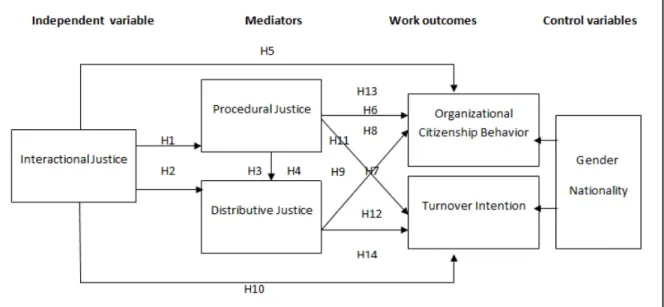
Data and Methodology
The aim of the present research was to bridge the current gap that exists, especially in the UAE and Arab countries, regarding the understanding of organizational justice, organizational citizenship behavior and turnover intention. The nature of the associations and the level of significance between these variables in the public health sector in the UAE are unknown. It was difficult for the researcher to conduct a survey of the entire public health sector of the UAE due to limited resources such as time constraints and costs.
For the stated reasons, the researcher randomly selected 500 respondents (employees in public health care) from the entire population of public health workers, representing the entire population. In this method, the researcher approaches the prospective respondent and presents the general objectives of the questionnaire, then leaves it to the respondent to complete. The instrument used a five-point Likert scale (to reduce response bias) ranging from 1 (strongly disagree) to 5 (strongly agree) to measure elements of the research constructs.
96 questionnaires were randomly distributed to respondents working in one of the public hospitals in the Emirate of Abu Dhabi (n=96 healthcare workers). After collecting a small sample questionnaire, Statistical Package Social Science (SPSS) was used to test the reliability and validity of the questionnaire. These items were chosen because of the high reliability found by Hassan and Hashim (2011) when used to measure turnover intention (Cronbach's alpha = 0.86).
In this study, the data were analyzed to assess the main hypothesis of the relationship between organizational fairness (interactional, procedural, and distributive fairness), organizational citizenship behavior, and turnover intent. An exploratory factor analysis has been performed to confirm the dimensionality of the applied measure.
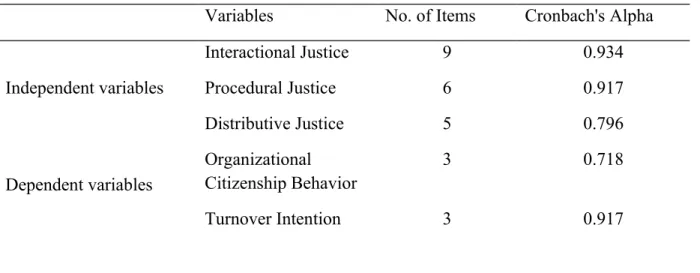
Results and Discussions
Second, to examine the direct relationship between interactional justice and distributive justice, distributive justice was entered as a dependent and interactional justice variable as an independent variable. The findings of the study are consistent with the previous findings between interactional and procedural justice (Wang et al., 2010), interactional justice and distributive justice (Cohen-Charash & Spector, 2001), and procedural justice and distributive justice ( Abu Elanain, 2010a). Interactional justice explanation was also significantly and positively related to distributive justice and OCB respectively, (B = 0.53, P<.001; B = 0.37, P<.001) and significantly and negatively related to.
This showed that procedural justice fully mediates the relationship between interactional justice and distributive justice. Results showed that interactional justice explanation was significantly and positively related to distributive justice (B = 0.53, P<.001), providing support for the first condition. The current study focused on exploring the impact of procedural and distributive justice as mediators of the relationship between interactional justice and work-related variables.
The results also revealed that procedural justice is the strongest variable for predicting organizational citizenship behavior, followed by interactional justice and then distributive justice. The study found that distributive justice is the strongest predictor of turnover intention, followed by procedural justice and then interactional justice. The results showed that employees' perceptions of interactional justice can influence employees' perceptions of procedural and distributive justice.
Relationships between interactional justice perceptions were positively and significantly related to procedural and distributive justice. The current study also found that procedural and distributive justice partially mediated the relationship between interactional justice and OCB.
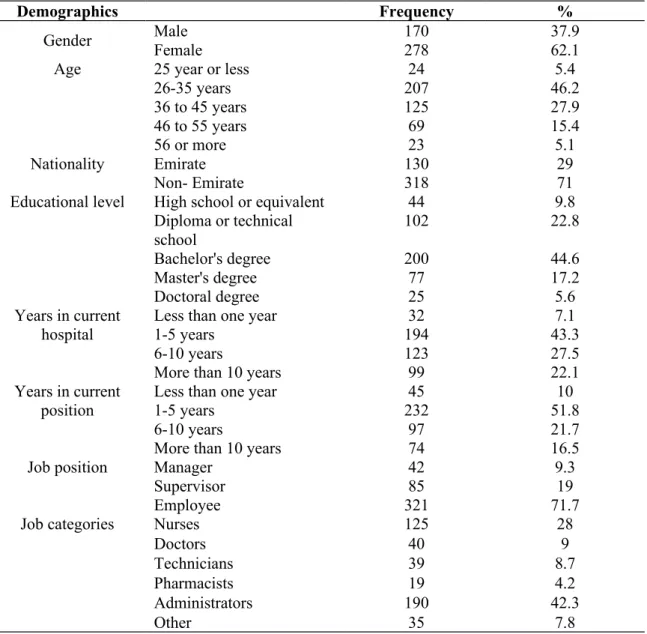
Implications & Suggestions for Future Research
First, and the most unique contribution of this study is that it is the first study in the UAE and the Middle East to examine the relationship between organizational justice, organizational citizenship behavior and turnover intention of healthcare workers using two dimensions of organizational justice. (Procedural and distributive justice) as mediators between interactional justice, organizational citizenship behavior and turnover intention. So, this study contributes to the understanding of the effects of organizational justice on both organizational citizenship behavior and turnover intention across the region. Second, this study not only empirically demonstrates the significant role organizational justice plays in enhancing organizational citizenship behavior and reducing employee turnover intentions in a non-Western context, but it also reveals the nature of this connection directly and indirectly through the mediating role as procedural and distributive justice.
This study has practical implications from a managerial point of view and could enhance management's understanding of organizational citizenship behavior and employee turnover intent to operate efficiently. Management should improve organizational equity by integrating this concept into its strategic thinking and actions, so as to improve the level of organizational citizenship behavior of employees and the intention to reduce employee turnover. Therefore, improving organizational equity can have a practical scope that ultimately improves employee retention and promotes organizational citizenship behaviors (Abu Elanain, 2010b).
Finally, this study used self-report measures of organizational citizenship behavior collected from employees, not the respondents' supervisors. Furthermore, organizational citizenship behavior was measured using a shortened version of the scale (which included only 3 items), and the use of shortened scales may reduce reliability and validity (Richards & Schat, 2011). First, future research could look at the relationship between organizational justice, organizational citizenship behavior, and turnover intention using other mediators, such as empowerment and participation in decision making.
Second, another area for future research could be to examine the impact of culture on employees' perceptions of organizational justice and its effect on organizational citizenship behavior and turnover intention. Fifth, it is suggested that future research in this area should be conducted using organizational citizenship behavior data based on supervisory ratings of employees.
Conclusion
Work locus of control and interactional justice as mediators of the relationship between openness to experience and civic behavior in organizations. 2013). The impact of organizational justice on the development of organizational citizenship behavior in Jordanian press organizations. The role of organizational citizenship behavior in turnover: conceptualization and preliminary testing of key hypotheses.
Combined effects of uncertainty and organizational justice on employee health: testing the uncertainty management model of equity judgments among employees in the Finnish public sector. 2011). The moderating role of organizational culture in the relationship between organizational justice and organizational citizenship behavior. Mediating role of trust in supervisor on the relationship between organizational fairness and citizenship behavior. The mediating effect of burnout on the relationship between structural empowerment and social citizenship behavior.
The influence of distributive justice on organizational citizenship behavior: Mediating role of emotional exhaustion and organizational attachment. The effect of employees' perceptions of organizational justice on organizational citizenship behavior: An application in Turkish public institutions. An examination of the role of justice in turnover intentions, job satisfaction, and organizational citizenship behavior in the hospitality industry.
Impact of organizational justice and organizational environment on health worker's turnover intention in Ekiti State, Nigeria.
